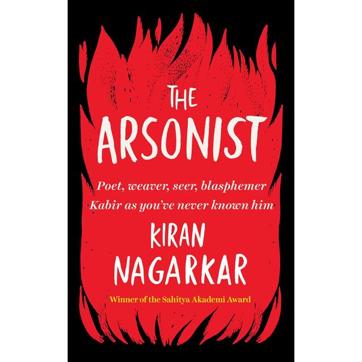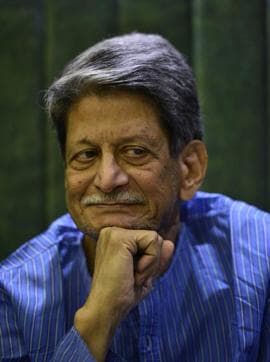Excerpt: The Arsonist by Kiran Nagarkar
In this profound telling of the mystic saint-poet’s life, Kabir is a speaker of Truth in a world full of conflict that could be ancient, medieval, or contemporary. This excerpt includes the introduction and Chapter 2

Nobody knows for certain when exactly the Bhakti saint Kabir was born. But the fact is Kabir is timeless. Which is why he is always timely. He is the contemporary of every age. And his time is forever ‘now’.
He was illiterate. And yet his dohas, as his poems were called, are beyond literate. They are the very essence of wisdom, often the opposite of received wisdom. The most curious thing about him is a separate oeuvre of his which introduces a radical surrealism in his meditations on God. His mordant wit, his sense of irony, sees through it all: life and death, faith and God, the banal and the profound, the spiritual and the mortal. His observations, his insights and his commentary on every aspect of our term on earth make us question our most revered beliefs and the humbug that often passes for religion or philosophy.
This book found itself being written because every now and then the ghastly things that were happening in Kabir’s own country, India, and across the world compelled me to ask how he would have responded to events that were occurring centuries after his death: the lynchings, the hate campaigns, the loss of humanity, sanity and compassion; the stupendous double-andtriple talk; the bottomless greed and mendacity; the wars, riots and ceaseless violence. The endless mass murders in the name of God and religion. And the wilful ignoring of the very real possibility of the extinction of mankind itself.
Would Kabir have managed to shake us awake and rise?
…
2
One afternoon when the Weaver was taking his siesta, two of his pupils, Ismael and Ananda, rushed into the house and woke him up.
‘I hope you’ve found God or something as important, Ananda. For if you haven’t, I’m going to beat the living daylights out of you.’
‘Is it true–’ Ananda was still out of breath, ‘that you were an ascetic and lived alone in the mountains?’
‘Is that why you woke me up, you fool?’
‘Answer the question, Master,’ Ismael said tersely.
The other apprentices left their looms and gathered around the Weaver.
‘Oh, I don’t remember. It was such a long time ago. And how does it concern you, anyway?’
‘No ascetic with any self-respect would ever return to a normal life or go back to his wife,’ Ismael sneered.
‘I guess I have no self-respect. Now may I go back to my nap?’
‘Why, why would you come back when you were supposed to be the greatest maharishi in the country?’
‘Can’t we talk about that some other time?’
‘Now,’ the pupils said impatiently.
The Master sat up and shook his head in disbelief and resignation. ‘Who is the Master here? You or me?’
They laughed and Ananda said, ‘We don’t know about you but we outnumber you thirty to one. So I guess we must be the boss-men here.’
‘When I was your age, I set out in search of God. Not small or medium-sized gods but the big one, the Almighty Himself. I was a pretty persistent sort and over the years I acquired a reputation as a holy man. They called me a sage and a seer. Some said I was a siddha and had miraculous powers.
‘I lived in the Himalayas in those days, some fourteen thousand feet above sea level. It was my seventh year of standing on one leg. My eyes were closed and my mind was focused on Brahman. People from far and near, from neighbouring principalities and distant kingdoms, trekked to the mountains to fall at my feet and receive my blessings. Sometimes they would wait for days, even weeks, to see me, for there was no telling how long my devotions and meditations would last.
‘Why do people go to see holy men? Because they believe the enlightened ones can make God bend down all the way from heaven to lend an ear. For them a sage is a go-between, a middleman, and who knows, God may be on the take. But I promised nothing. If I had, as was rumoured, magical powers, I was keeping them to myself. And yet they kept coming, an endless march of pilgrims, the rich and the poor, men, women and children, the lame and the halt and the handicapped; those who needed their lives fixed and those who needed nothing. They came to sit in the shadow The Arsonist 5 of saintliness and be touched by someone who, for all they knew, was privy to God’s thoughts.
‘One day the blacksmith’s wife from a nearby village came to see me with her son. He was of an indeterminate age, he could have been twenty-five or maybe he was close to forty. His mouth was open and there was a vacuous smile on his face.’
‘Don’t just stand there, you fool. Touch the Master’s feet, the mother snapped at him.’
He bent down and lay prostrate in front of me, his hands joined prayerfully for a full five minutes.
‘Bless him, Master,’ the mother said. ‘I’ve seven daughters and one son. His name is Suraj. He’s a good boy and his heart is in the right place but he’s a little simple. He’s slow to learn and gets a beating from his father almost every week.’
‘Tell the blacksmith to beat iron and not the boy, I told her. The simple of heart, I suspect, are closer to God than all the subtle scholars of the world. Rise, my son. I put my hand on his head. May God be with you.’
‘Likewise,’ Suraj said and laughed as if he had said something vastly funny.
He would come by from time to time and watch me from a distance.
I would forget him and then hours later realize that he was still staring at me.
It was the beginning of February and a cold nasty wind was blowing, the one they call the Intruder. It whistled inside your bones and froze your blood. The blacksmith’s son came up to me and wrapped a shawl around my shoulders.
‘I thank you for your kindness,’ I told him, ‘but I must 6 Kiran Nagarkar return your gift, for I have vowed that whatever the season, however inclement the weather, I will endure it.’
The blacksmith’s son looked puzzled. ‘Why would you do this, Master?’
‘A small token,’ I smiled self-deprecatingly, ‘of my devotion to God.’ ‘I have brought you some bread that my mother made and raw chillies. They’ll bring warmth to your shivering body.’
‘That is kind of you, Suraj. I’m touched by your concern but I’ll not touch food for the next three weeks.’
‘And why would you do this, Master? Are you unwell?’
‘Nothing of the sort,’ I said. ‘Just another small token of my affection for the Almighty.’

‘Does it give God pleasure then when people starve or freeze to death?’ he asked innocently. ‘Is that why people scourge themselves?’
‘Oh no, no. The good Lord doesn’t ask anything of us. It’s just a way of showing my love for him.’
‘Is that why you stand on one leg?’
‘Yes, that is the very reason.’
‘You have a rather funny way of showing your love, Master. For if God wanted us to be one-legged, he wouldn’t have given us two.’
I smiled at his naivety but decided to humour him. ‘Maybe you’ve got a point there.’
‘What else have you given up, Master?’ ‘Not much really. I shaved my head, left my young wife and my child of two months. And my elderly parents. They didn’t want me to go since I was their only child and the sole breadwinner. “Who will run the workshop and who’ll look after us?” they asked. ‘“God will,” I told them. He takes care of his own.’
‘What workshop? Are you too an iron-master?’
‘No. I was Chief Weaver by appointment to His Majesty. All the princesses and queens wore fabrics woven on my looms.’
‘All this you gave up? No wonder they call you maharishi.’
‘Just a trifle. Nothing more. I bade farewell to my job as the village mukhiya. The villagers said, “Who will save us when the floods come and who will listen to our troubles?” ‘And I told them that power is an unquenchable thirst, and high office a pair of shackles. I will have nothing to do with them. Everything I had desired, I parted with.’
‘Surely then you must part with the Almighty too.’
I laughed and asked him, ‘Pray, why should I part with the Almighty?’
‘Because you desire God more than anything else in the world.’
I was nonplussed. Was this man just stupid or was he the devil incarnate? ‘You think that I would forsake the most precious thing in my life?’ I spoke with suppressed rage.
The blacksmith’s son fell at my feet and clung to my ankles. ‘Mercy, Master, have mercy on me. I will not get up till you’ve forgiven an ignorant man with a loose tongue.’
‘Rise blacksmith,’ I said, ‘I bear you no ill will.’
‘Your love of God is indeed great, Master. Greater than any other man’s,’ the blacksmith’s son said and bowed. ‘I’ll take your leave now.’
‘May God be with you,’ I said.
He never showed up again. The Weaver paused. It was I who visited him some months later. He was in the smithy and cleared some cast-iron scrap off a bench to make room for me to sit and asked his mother to get me a glass of buttermilk.
Read more: Review: Jasoda by Kiran Nagarkar
What can I do for you, Master? he asked me.
Will you be my teacher, my guru?
Me? He seemed astounded by the suggestion.
Yes. You have more wisdom than all my years of searching for the Almighty have given me. You taught me that one can get a little too attached to selflessness. You taught me that at the end of the day a man must renounce renunciation itself.
The blacksmith smiled. I taught you, Master? You are pulling my leg.
I’m not, I told him emphatically. I’ve never been more serious. Be my guru.
He laughed then, a loud guffaw that shook the smithy. You’ve got to be joking, he said. Do you think I’ve nothing better to do?
Ja ghat prem na sancharey,
So ghat jaan masaan,
Jaise khaal lohar ki,
Saans let bin praan
That pot which Is not filled with love,
Beware,it is as barren as the burial grounds
Just like the blacksmith’s bellows,
It breathes bereft of life.






